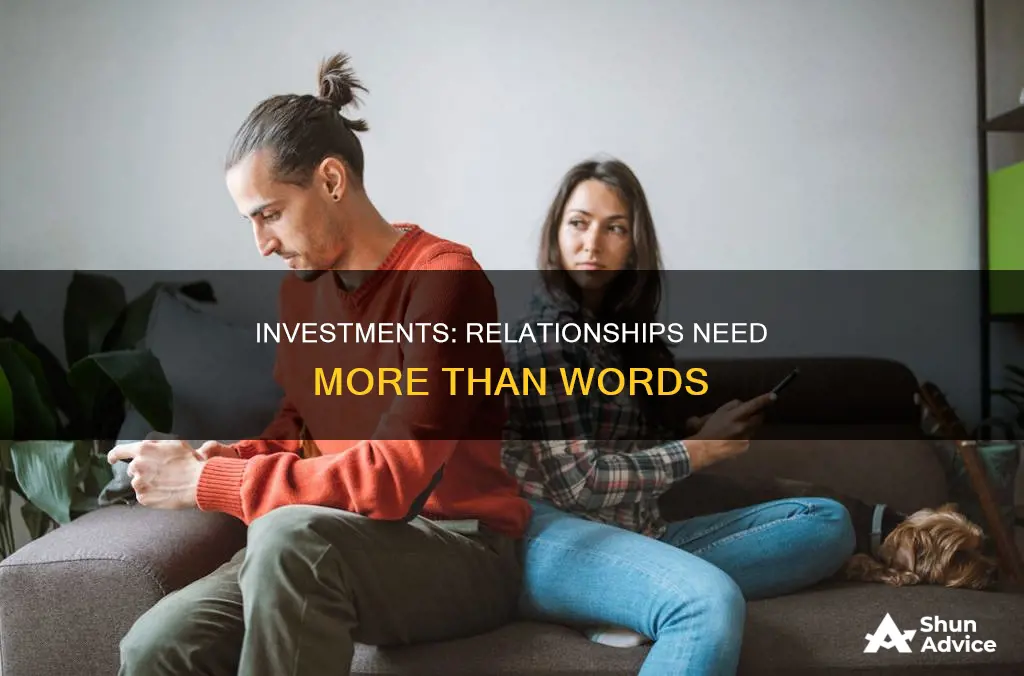
Relationships are complex, and it's easy to invest too much or too little without realising. Overinvesting in a relationship can lead to resentment and heartache, while underinvesting can cause a relationship to stagnate and wither. It's a delicate balance, and sometimes people underinvest without even realising it. This could be due to a lack of self-awareness, or simply not understanding what a healthy relationship looks like. People who have experienced trauma or unhealthy relationships in the past may also struggle to invest healthily in future relationships. It's important to be mindful of your own needs and boundaries, as well as those of your partner, to ensure a mutually beneficial and fulfilling relationship.
| Characteristics | Values |
|---|---|
| People-pleasing | Burn out or become numb |
| Withholding negative emotions | Drains energy |
| Pretending nothing is wrong | Leads to unhappiness |
| Being overly helpful | Creates co-dependent relationships |
| Defining happiness as being in a relationship | Sets you up for failure |
| Not meeting each other's needs | Creates resentment |
| Not integrating each other into your lives | Lack of commitment |
What You'll Learn

You depend on your partner for your happiness
Depending on your partner for your happiness is detrimental to both your relationship and your individual self. While it is normal and healthy for your partner to be a major source of happiness in your life, it becomes unhealthy when you rely solely on them. No one person can provide all the things you need for happiness, and placing this expectation on your partner is unfair and unrealistic.
How to Recognise if You're Too Dependent
- You mirror your partner's mood: You adopt your partner's mood, regardless of how you actually feel. This is different from having empathy for your partner and being attuned to their emotions.
- You need their validation: You crave praise from your partner and need to know their reaction to any big life update before you can celebrate.
- You feel threatened by others: You feel jealous when your partner finds happiness outside of your relationship, whether it's from a friend, family member, or coworker.
- You constantly seek reassurance: You are insecure about your happiness in the relationship and are always checking in with your partner about how happy they are.
- You make decisions based on their wants: You are not comfortable asserting your opinion and making decisions with your partner. You are only happy when your partner gets their way.
- You equate happiness with being in a relationship: You are happy simply because you are in a relationship, rather than because of the things your partner does or says.
- You get anxious when your partner is not with you: You are not happy or secure in your relationship unless your partner is physically by your side.
What to Do if You're Too Dependent
- Acknowledge the behaviour: Communicate to your partner what you want to change so that they are aware and can be supportive.
- Evaluate what makes you, you: Take time to identify what makes you happy and practice finding happiness for yourself. Focus on personal growth and nurture your own interests and hobbies.
- Cultivate self-love and self-care: Understand and appreciate yourself, your strengths, and your passions. Build confidence and a sense of fulfillment that can positively impact your relationships.
Madoff Victims: A Global Reach
You may want to see also

You withhold negative emotions
Withholding negative emotions can be detrimental to your relationship and your own well-being. When you choose not to express your emotions to your partner, you run the risk of burning out or having an emotional outburst. It is a form of "stonewalling", which leads to lower marital satisfaction for both partners.
Emotional suppression requires cognitive effort and can manifest as "pouting" or withdrawing after an argument. While it may seem like the best course of action in the moment, research shows that it is better to resist this temptation. Withholding emotions and affection can have long-lasting negative consequences for your relationship, even outlasting the conflict that prompted the behaviour in the first place.
When you suppress your emotions, you may find yourself experiencing malignant physiological responses, such as increased vascular resistance and higher levels of cortisol reactivity during emotional conversations. This can lead to a decrease in intimacy with your partner. By not being transparent about your emotions, you are preventing the opportunity for dialogue and discussion, which could help address issues and move the relationship forward.
Instead of withholding, try to acknowledge and manage your emotions for a healthier relationship. Take a moment to identify how you are feeling and why. Deep breathing can help to calm the fight-or-flight response that often accompanies strong emotions. Reflect on the emotion and consider whether your partner intended to make you feel this way, or if it could be a misunderstanding. Remember that you are in control of how you respond to your emotions.
It is important to share how you are feeling before things escalate, and to learn how to express anger or fear in a kinder way. By doing so, you can increase emotional intimacy and improve communication with your partner.
Vanguard Investors: How Many?
You may want to see also

You are overly helpful
Being overly helpful in a relationship can be a complex issue, and it's important to recognize when this behaviour might be causing problems. Here are some expanded points on why being overly helpful can be detrimental:
Firstly, there is a fine line between being supportive and being overly helpful. When you become overly helpful, it can turn into a craving or even a compulsion to act. You might feel an "action urge" to solve problems and manage situations, which can lead to feelings of anxiety and a need to stay in control. This can result in a dynamic known as the Dreaded Drama Triangle, where you see yourself as a Victim to your feelings, a Persecutor to others, or a Rescuer trying to please everyone.
Being overly helpful can also lead to codependency in a relationship. You might find yourself constantly pleasing your partner to avoid conflict or gain their approval. This can result in your partner becoming tired of never experiencing the real you. Additionally, if your partner has unhealthy behaviours, such as addiction, your excessive help may enable them to continue their harmful actions without facing the consequences.
Another consequence of being overly helpful is that you may teach your partner to rely on you while they escape their responsibilities. This can lead to feelings of resentment and exhaustion on your part. It's important to recognize that you have a choice and that you don't have to react to every situation. By pausing and choosing not to give in to the "action urge," you can start to set healthier boundaries in your relationship.
Being overly helpful can also stem from a need to be perceived as good and kind. However, constantly putting others' needs before your own can lead to repressed emotions and a build-up of resentment. It's important to allow yourself to feel and express a range of emotions, rather than suppressing them to maintain a façade of niceness.
Finally, being overly helpful can be a form of manipulation, whether conscious or unconscious. It can be a way to get what you want by displaying unwarranted affection or seeking praise and appreciation. This can create a toxic dynamic in the relationship, leading to mistrust and resentment.
In summary, while it's great to be supportive, being overly helpful can lead to codependency, resentment, and a loss of self. Recognizing and addressing this behaviour is crucial for fostering a healthy and balanced relationship.
Who Really Knows How to Invest?
You may want to see also

You define happiness as being in a relationship
It's important to note that while being in a relationship can contribute to happiness, it's not the sole determinant. Happiness is a complex emotion that stems from various factors, including self-nurturing, personal growth, and meaningful connections.
The Pitfalls of Defining Happiness as Being in a Relationship
If you equate happiness with being in a relationship, you may end up in a cycle of dependence, where your sense of self-worth and contentment is entirely reliant on your partner. This can lead to people-pleasing behaviours, where you prioritise your partner's happiness over your own, ultimately resulting in burnout and unhappiness.
Additionally, defining happiness solely through the lens of a relationship can hinder your personal growth and self-discovery. By investing all your emotional energy into the relationship, you may neglect your own needs, hobbies, and personal goals, leading to a loss of individuality and a diminished sense of self.
Redefining Happiness: Focusing on Self-Nurturing and Friendship
Instead of seeking happiness exclusively through relationships, it's crucial to cultivate happiness from within. This involves nurturing yourself, addressing your own needs, and discovering what truly makes you happy. By finding happiness and peace within yourself, you become a source of positivity and contentment, which can then be shared and amplified in your relationships.
Friendships also play a vital role in happiness. Studies have shown that individuals with strong ties to friends and family and a commitment to spending time with them tend to have higher levels of well-being. Close friendships and family relationships provide a sense of belonging, support, and joy, all of which contribute to overall happiness.
The Benefits of Companionate Love
When it comes to romantic relationships, the type of love that tends to bring the most happiness is companionate love. This type of love is based on stable affection, mutual understanding, and commitment, rather than just passionate highs and lows. Companionate love often grows from a foundation of friendship, where both individuals genuinely like and respect each other, beyond the initial attraction.
Companionate love is more likely to withstand the test of time because it relies on familiarity and a deep emotional connection. It provides a sense of security, trust, and mutual support, which are essential for long-term happiness and well-being.
In conclusion, while being in a relationship can be a source of happiness, it's important to recognise that happiness is multifaceted. By nurturing yourself, cultivating meaningful friendships, and striving for companionate love, you can create a more sustainable and fulfilling kind of happiness.
ESG Investing: Who's On Board?
You may want to see also

You tolerate their annoying habits
It's normal to find your partner's habits annoying at times. Everyone has different approaches to life, and when two people bring their lives together to form a relationship, there are bound to be moments of irritation, even in a healthy coupling.
However, tolerating your partner's annoying habits without addressing them can lead to a decline in relationship satisfaction over time. It's important to remember that it's not the habit itself that is the problem, but how you deal with it. Here are some ways to address your partner's annoying habits:
- Communicate constructively: Instead of demanding or nagging, make a suggestion followed by an appreciative comment and a loving gesture. For example, if your partner throws their towel on the floor after a shower, express your appreciation for their efforts in other areas, then suggest hanging the towel on a hook.
- Pick your battles: Not every annoying habit needs to be addressed. Determine which habits are worth discussing and focus on those that truly matter to you.
- Make a habit trade: Recognize that you also have annoying habits. Ask your partner which habit they would like you to quit, and make a trade, with each of you working on one thing for the other.
- Focus on the positive: Instead of fixating on your partner's annoying habits, make an effort to look for the good in them and focus your energy on their positive attributes.
- Suggest lovingly: Avoid lashing out with a furious tone, as this can harm your partner's spirit and lead to arguments. Instead, make suggestions in a respectful and kind manner.
- Preoccupy yourself: If your partner is trying to improve their annoying habit, keep yourself busy to take your mind off it and give them time to develop a new habit.
- Become acclimated: You might need to develop a tolerance for some of your partner's habits. If they are making an effort to change some of their behaviours, you may need to accept that others will be more difficult to modify.
- Lead by example: Demonstrate the behaviour you would like to see in your partner. If they pick up your good habits, it can help them break their annoying ones.
- Try it their way: Show your partner the impact of their annoying habit by doing it yourself. For example, if they leave dirty clothes on the floor, do the same and let the mess build up until they are motivated to change.
- Seek relationship counselling: If your partner's annoying habits are negatively affecting your relationship, consider seeking professional help to work through these issues together.
Analyzing Investment Opportunities: Strategies for Success
You may want to see also
Frequently asked questions
If you feel like you're the only one putting in any effort, or taking the relationship seriously, it might be a sign that you're investing less. Other signs include being the only one to initiate sex, always being the one to apologize, or planning your schedule around them when they don't do the same for you.
Investing less in a relationship can lead to an unhealthy dynamic where one partner feels unloved, neglected, or resentful. It can also create a sense of imbalance and unfairness, which can cause conflict and resentment over time.
It's important to communicate your needs and expectations clearly and work together to address any imbalances. Both partners should contribute to the relationship and be willing to make changes for the sake of the other.
If you're constantly compromising your own needs and happiness for the sake of the relationship, or if you're dependent on your partner for your own sense of self-worth, you might be overinvesting. It's important to maintain your independence and sense of self outside of the relationship.







